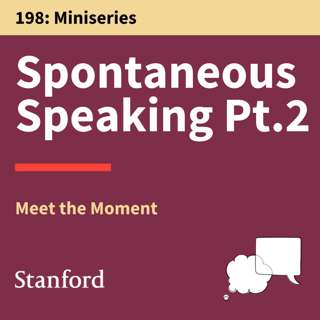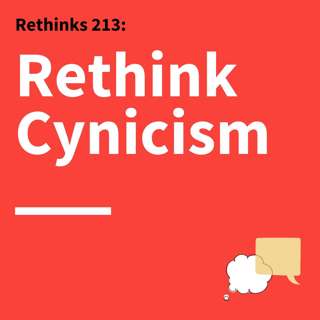
213. Rethinks: Building Trusting Relationships Through Communication
How to turn doubt and suspicion into hopefulness and trust.There’s a lot in the world to make us cynical about other people and their motives and intentions. But by “trusting loudly,” Professor Jamil Zaki believes we can renew our faith in one another.Zaki is a professor of psychology at Stanford, director of the Stanford Social Neuroscience lab, and author of several books, including his most recent, Hope for Cynics: The Surprising Science of Human Goodness. While many people feel suspicious of others and are reluctant to trust them, Zaki finds that relying on other people is a necessary part of forming relationships.“Acts of trust are the bedrock on which relationships are formed,” Zaki says. “The only way that strangers become friends and friends become best friends, the only way that we can build partnerships is through a willingness to count on one another.”In this Rethinks episode of Think Fast, Talk Smart, Zaki joins host Matt Abrahams to discuss practical strategies for fostering trust and challenging our cynical assumptions, offering a hopeful perspective on human nature, backed by surprising scientific insights.Episode Reference Links:Jamil ZakiJamil’s Lab: Stanford Social Neuroscience Lab Jamil’s Book: Hope for CynicsEp.158 Hope for Cynics: Building Trusting Relationships through Communication Ep.84 Quick Thinks: How Others Define UsEp.129 Connect Deeply: How to Communicate So People Feel Seen and Heard Connect:Premium Signup >>>> Think Fast Talk Smart PremiumEmail Questions & Feedback >>> hello@fastersmarter.ioEpisode Transcripts >>> Think Fast Talk Smart WebsiteNewsletter Signup + English Language Learning >>> FasterSmarter.ioThink Fast Talk Smart >>> LinkedIn, Instagram, YouTubeMatt Abrahams >>> LinkedInChapters:(00:00) - Introduction (02:36) - Defining Trust and Its Importance (03:27) - Building Better Trust (04:58) - Understanding Cynicism (07:20) - The Cynicism Spectrum (09:40) - Fostering Hopeful Skepticism (11:54) - Challenges of Overcoming Cynicism (13:46) - Positive Gossip and Positive Noticing (16:44) - Self-Fulfilling Prophecies (19:40) - The Final Three Questions (28:02) - Conclusion ********This episode is sponsored by Grammarly. Let Grammarly take the busywork off your plate so you can focus on high-impact work. Download Grammarly for free today Join our Think Fast Talk Smart Learning Community and become the communicator you want to be.
1 Jul 202529min
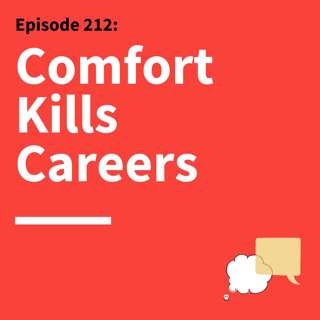
212. Break It to Make It: Disrupt Your Way to the Perfect Job Fit
Career growth starts with stepping outside your comfort zone.Building a successful career isn’t about following a set path—it’s about knowing when to evolve and embracing change. Whitney Johnson believes that success comes from disrupting yourself—challenging routines, stepping into discomfort, and continuously evolving. “People think staying in their comfort zone is the safe choice,” she explains, “but real growth happens when we take intentional risks.”As a bestselling author and leadership expert, Johnson has spent years helping individuals and organizations navigate change. She breaks down the S-curve of learning, a framework that helps professionals recognize when it’s time to move on, pivot, or double down on their current path. From identifying signs of stagnation to developing strategies for career reinvention, she shares practical tools for making bold moves with confidence.In this episode of Think Fast, Talk Smart, Johnson joins host Matt Abrahams to explore why mastery can be a sign that it’s time for a change, how to manage the discomfort that comes with growth, and why personal disruption isn’t just a challenge—it’s the key to long-term success.To listen to the extended Deep Thinks version of this episode, please visit FasterSmarter.io/premiumEpisode Reference Links:Whitney JohnsonWhitney’s Books: Disrupt Yourself / Smart GrowthEp.147 Disrupt Yourself: How to Innovate Who You Are and Become Who You Can Be Connect:Premium Signup >>>> Think Fast Talk Smart PremiumEmail Questions & Feedback >>> hello@fastersmarter.ioEpisode Transcripts >>> Think Fast Talk Smart WebsiteNewsletter Signup + English Language Learning >>> FasterSmarter.ioThink Fast Talk Smart >>> LinkedIn, Instagram, YouTubeMatt Abrahams >>> LinkedInChapters:(00:00) - Introduction (02:11) - What Is Personal Disruption? (04:19) - Signs It’s Time to Disrupt Yourself (06:41) - Getting Comfortable with Discomfort (11:38) - Finding Your Next Career Move (15:27) - Ensuring Fulfillment After Disruption (21:29) - Best Career Advice Received (23:02) - Career Regrets & Lessons (24:33) - Conclusion ********This episode is sponsored by Grammarly. Let Grammarly take the busywork off your plate so you can focus on high-impact work. Download Grammarly for free today Join our Think Fast Talk Smart Learning Community and become the communicator you want to be.
26 Jun 202525min
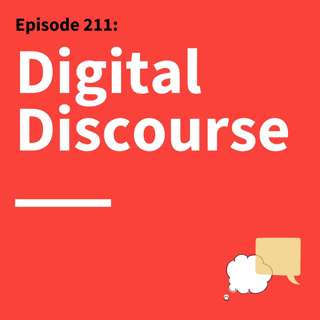
211. Small Screens, Strong Signals: Mastering Modern Communication
In the age of virtual communication, here’s how to ensure your messages convey what you mean.Texts. Emails. Slacks. Zooms. We’re communicating in more ways than ever, but Andrew Brodsky has a word of warning: Your virtual communication might be sending messages you’re not aware of.Brodsky is the author of PING: The Secrets of Successful Virtual Communication. And as a professor of management at the University of Texas McCombs School of Business, he researches the impact of technology on workplace communication. “In virtual communication, there's often missing information,” he says. “As recipients of it, we're searching to fill in the gaps. The problem [is] that the recipient who's making these guesses is often guessing incorrectly.” As his research reveals, variables like typos, the time you schedule a meeting, and even your choice of email signature affect how your messages are received — and how you’re perceived.In this episode of Think Fast, Talk Smart, host Matt Abrahams and Brodsky explore his PING framework (perspective-taking, initiative, nonverbal awareness, and goals) for mastering digital communication. From understanding when to choose email over a phone call to navigating cameras-on versus cameras-off meetings, he offers practical strategies for ensuring your virtual messages communicate exactly what you intend.To listen to the extended Deep Thinks version of this episode, please visit FasterSmarter.io/premiumEpisode Reference Links:Andrew BrodskyAndrew’s Book: PingEp.31 Quick Thinks: How to Shine Online and Excel at Virtual Communication Ep.53 Step Up and Stand Out: How to Create the Right Environment for Communication Connect:Premium Signup >>>> Think Fast Talk Smart PremiumEmail Questions & Feedback >>> hello@fastersmarter.ioEpisode Transcripts >>> Think Fast Talk Smart WebsiteNewsletter Signup + English Language Learning >>> FasterSmarter.ioThink Fast Talk Smart >>> LinkedIn, Instagram, YouTubeMatt Abrahams >>> LinkedInChapters:(00:00) - Introduction (02:07) - What Is Virtual Communication? (02:53) - Choosing the Right Channel for Your Goal (05:38) - The Ping Framework: Secrets to Virtual Communication (09:34) - Understanding Communication Richness (12:36) - Nonverbals in Virtual Communication (16:20) - The Final Three Question (24:57) - Conclusion ********This episode is sponsored by Grammarly. Let Grammarly take the busywork off your plate so you can focus on high-impact work. Download Grammarly for free today Join our Think Fast Talk Smart Learning Community and become the communicator you want to be.
24 Jun 202526min
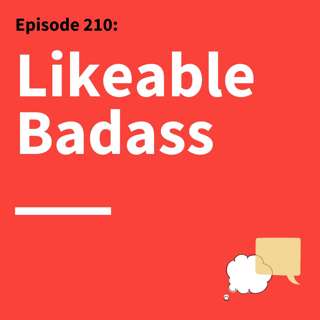
210. First Impression to Lasting Impact: Use Status Strategically
Career success takes a status boost, not a power grab.How do you chart the career course you’ve always imagined? According to Alison Fragale, it’s about gaining influence through status, power, and ultimately, being “a likeable badass.”As a research psychologist, professor, speaker, and author, Fragale is on a mission to help women take control of their careers. In her book Likeable Badass: How Women Get the Success They Deserve, she argues that most people have it backwards when pursuing career advancement. "We have talked for a long time [about] getting more power," she explains. However, by focusing first on achieving status (how respected we are), power will often come as a natural byproduct. "If you pursue status before, or at least alongside power, everything is going to fall into place," she says. “Status makes power a lot easier to achieve, and it makes power a lot easier to use.”In this episode of Think Fast, Talk Smart, hosted by executive producer Jenny Luna, Fragale explores the communication strategies of a likeable badass, from building warmth and assertiveness to authentically connecting with colleagues. Whether you're building relationships in a new company or have been leading one for years, Fragale’s insights will help you command respect while communicating with kindness.To listen to the extended Deep Thinks version of this episode, please visit FasterSmarter.io/premiumEpisode Reference Links:Alison FragaleAlison’s Book: Likeable BadassJenny LunaEp.12 It's Not What You Say, It’s How You Say It: How To Communicate PowerEp.15 The Art of Negotiation: How to Get More of What You Want Connect:Premium Signup >>>> Think Fast Talk Smart PremiumEmail Questions & Feedback >>> hello@fastersmarter.ioEpisode Transcripts >>> Think Fast Talk Smart WebsiteNewsletter Signup + English Language Learning >>> FasterSmarter.ioThink Fast Talk Smart >>> LinkedIn, Instagram, YouTubeMatt Abrahams >>> LinkedInChapters:(00:00) - Introduction (02:02) - Defining Power and Status (05:07) - Why Status Comes Before Power (06:00) - Communication Techniques to Build Status (09:08) - Evaluating Your Habits: Nonverbal and Verbal Cues (11:02) - Mentorship in Developing Communication (12:54) - Adapting to a New Work Culture (18:22) - Representing Difference Without Distance (19:30) - Overcoming Bad First Impressions (22:55) - The Final Three Question (26:40) - Conclusion ********This episode is sponsored by Grammarly. Let Grammarly take the busywork off your plate so you can focus on high-impact work. Download Grammarly for free today Join our Think Fast Talk Smart Learning Community and become the communicator you want to be.
17 Jun 202527min
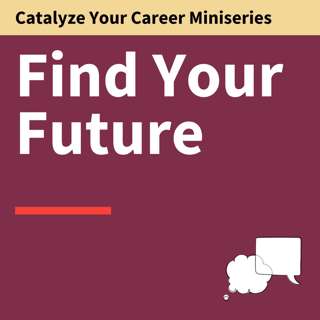
209. Find Your Fit, Find Your Focus - Catalyze Your Career
How to turn curiosity, clarity, and AI into your most powerful job search tools.Job search isn’t just about landing your next role—it’s about understanding who you are and how you want to show up in the world. According to Andrew Seaman, Senior Managing Editor for Jobs and Career Development at LinkedIn, that process begins with curiosity, not certainty. “People assume they need to apply to dozens of jobs with a perfect résumé,” he explains. “But the best applications are rooted in self-awareness and strategy—not spray-and-pray.”Instead of rushing to the next opportunity, Seaman encourages job seekers to slow down, ask better questions, and prioritize conversations over checklists. From informational interviews to profile updates, clarity is key—knowing what you want and telling a story that shows why you’re the right fit. With tools like LinkedIn’s Job Match and natural-language job search, candidates can now assess how they align with a role—and where they can grow. “It’s not just about being qualified,” Seaman says. “It’s about showing the value you bring.”In this episode of Think Fast, Talk Smart, Seaman joins host Matt Abrahams for our Catalyze Your Career miniseries to share how to job search with intention. Using Matt’s “Four I’s” framework—identifying, investigating, initiating contact, and interviewing—they explore how strategic storytelling, thoughtful networking, and AI tools can help you stand out in a crowded market.Episode Reference Links:Andrew SeamanEp.184 Fit or Quit? Find the Job That is Right For You—Catalyze Your CareerEp.187 Experimenting, Failing, and Finding Your Job Fit - Catalyze Your Career Ep.151 Get Hired: How the Right Communication Can Advance Your Career Connect:Premium Signup >>>> Think Fast Talk Smart PremiumEmail Questions & Feedback >>> hello@fastersmarter.ioEpisode Transcripts >>> Think Fast Talk Smart WebsiteNewsletter Signup + English Language Learning >>> FasterSmarter.ioThink Fast Talk Smart >>> LinkedIn, Instagram, YouTubeMatt Abrahams >>> LinkedInChapters:(00:00) - Introduction (01:58) - What’s Changing in Job Search (03:18) - Identifying Roles with Curiosity (06:18) - Investigating Companies & Roles (07:42) - Initiating Contact Effectively (10:58) - Crafting a Strong Narrative (12:10) - How Job Match Can Help (15:30) - Strategic vs. Shotgun Approach (20:29) - Best Career Advice Received (22:52) - Career Regrets & Lessons (24:21) - Conclusion ********This episode is sponsored by Grammarly. Let Grammarly take the busywork off your plate so you can focus on high-impact work. Download Grammarly for free today Join our Think Fast Talk Smart Learning Community and become the communicator you want to be.
12 Jun 202525min
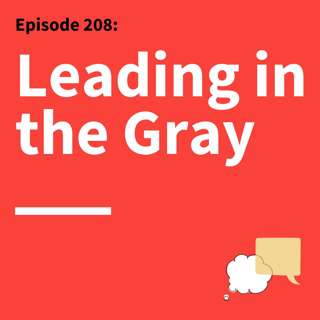
208. Ambiguity to Action: Tensions and Trade-Offs of Leadership and Communication
Amidst constant change, clear communication is the key to navigating uncertainty.How do you communicate with others when you’re confused yourself? For Rob Siegel, leadership isn’t about avoiding uncertainty, it’s about embracing the clarity that ambiguity can bring."What if ambiguity is the new normal?" asks Siegel, a venture investor and lecturer at Stanford Graduate School of Business. From rapidly evolving AI to ratcheting geopolitical tensions, every day brings a “crisis du jour,” he says. “I may like it, I may not like it. That doesn't really matter, but I've gotta get my team through it."In his latest book, The Systems Leader: Mastering the Cross Pressures That Make or Break Today's Companies, Siegel explores how leaders today are “living in dualities,” caught between managing existing processes and adapting to emerging disruptions. “The sooner we get comfortable with [change] in the sense of ‘I don't have to like it, but I can deal with it,’ then [we can] lead our teams and give them the calm to know they can get through this.”In this episode of Think Fast, Talk Smart, Siegel and host Matt Abrahams explore how to communicate effectively amidst constant change. From preparation strategies for spontaneous speaking to building trust through candid conversations, Siegel offers practical tips for communicating with clarity when nothing is certain but change.To listen to the extended Deep Thinks version of this episode, please visit FasterSmarter.io/premiumEpisode Reference Links:Robert SiegelRob’s Book: The Systems LeaderEp.35 Leading From The Hot Seat: How To Communicate Under PressureEp.37 Be Better: How Communication Catalyzes Business Transformation Connect:Premium Signup >>>> Think Fast Talk Smart PremiumEmail Questions & Feedback >>> hello@fastersmarter.ioEpisode Transcripts >>> Think Fast Talk Smart WebsiteNewsletter Signup + English Language Learning >>> FasterSmarter.ioThink Fast Talk Smart >>> LinkedIn, Instagram, YouTubeMatt Abrahams >>> LinkedInChapters:(00:00) - Introduction (01:55) - Adapting Leadership for Uncertainty (03:00) - Systems Leadership and Cross Pressures (04:22) - Communication and Context (05:08) - Framing Complex Ideas (06:03) - Innovation vs. Execution (07:53) - Leading Through Ambiguity (09:15) - Short-Term vs. Long-Term Focus (12:26) - Balancing Strength and Empathy (15:08) - Leadership with Humanity (16:24) - Engaging Students Effectively (19:42) - The Final Three Questions (24:50) - Conclusion ********This episode is sponsored by Grammarly. Let Grammarly take the busywork off your plate so you can focus on high-impact work. Download Grammarly for free today Join our Think Fast Talk Smart Learning Community and become the communicator you want to be.
10 Jun 202525min

207. From Conflict to Connection: Having Crucial Conversations that Count
How victim, villain, and helpless stories sabotage our most important conversations.The hardest conversations aren’t just about what you say to the other person. According to Joseph Grenny, critical conversations begin with the stories that you tell yourself.As a leading expert on business performance and communication, and a New York Times bestselling co-author of Crucial Conversations, Grenny explains that navigating high-stakes communication starts by examining the internal narratives we bring into these situations. “You and I use three consistent types of stories in these moments that don't serve us well,” he says: Victim stories (emphasizing our innocence), villain stories (demonizing the other person), and helpless stories (justifying our poor responses). "Those three kinds of stories are what amp up our emotions and justify us in our unhealthy responses," he says.In this episode of Think Fast, Talk Smart, Grenny joins Matt Abrahams to share practical strategies for mastering difficult conversations through what he calls "TLC" — truth, love, and competence. From recognizing your motives during conflict to accepting your role in creating it, he offers tools for staying focused on what you really want rather than getting hijacked by short-term emotional impulses.To listen to the extended Deep Thinks version of this episode, please visit FasterSmarter.io/premium Episode Reference Links:Joseph GrennyJoseph’s Book: Crucial Conversations Ep.105 Radical Candor: The Communication Shift That Can Transform Your CareerEp.148 Conviction and Compassion: How to Have Hard Conversations Connect:Premium Signup >>>> Think Fast Talk Smart PremiumEmail Questions & Feedback >>> hello@fastersmarter.ioEpisode Transcripts >>> Think Fast Talk Smart WebsiteNewsletter Signup + English Language Learning >>> FasterSmarter.ioThink Fast Talk Smart >>> LinkedIn, Instagram, YouTubeMatt Abrahams >>> LinkedInChapters:(00:00) - Introduction (01:58) - Influence & Why It Matters (03:57) - Truth & Love: The Foundation of Accountability (06:17) - Showing You Care & Respect Others (08:01) - Recognizing Motives in High-Stakes Moment (13:55) - Managing Emotions in Crucial Conversations (19:50) - The Final Three Questions (26:33) - Conclusion ********This episode is sponsored by Grammarly. Let Grammarly take the busywork off your plate so you can focus on high-impact work. Download Grammarly for free today Join our Think Fast Talk Smart Learning Community and become the communicator you want to be.
3 Jun 202527min
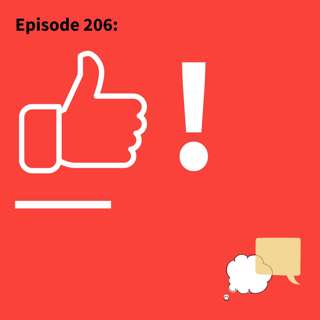
206. Crafting Narratives That Motivate: What’s Your Strategy Story?
Great strategy starts with a question—and a story worth believing in.A good strategy isn’t just built—it’s told. For Martin Reeves, chairman of the BCG Henderson Institute and author of The Imagination Machine and Like: The Button That Changed the World, strategy and imagination are both deeply communicative processes, rooted in storytelling, curiosity, and the courage to reframe assumptions.“A strategy is really just a special kind of story,” Reeves explains. “It begins with the present and aspires to a different future—it’s fiction made actionable.” To bring that fiction to life, leaders must involve their teams in a co-creative journey and use thoughtful questions to shape not just ideas, but belief and action.In this episode of Think Fast, Talk Smart, Reeves joins Matt Abrahams to explore how communication fuels strategic thinking, innovation, and organizational reinvention. He outlines his six-step framework for imagination—from embracing anomalies to codifying and continuing ideas—and underscores the role of reframing, deep listening, and even levity in solving complex problems. Together, they unpack how a single “like” button changed our digital behaviors—and what it teaches us about influence and attention today.Episode Reference Links:Martin Reeves Martin’s Books: Like / The Imagination Machine Ep.71 Strategy Success: How to Communicate Your Gameplan Connect:Premium Signup >>>> Think Fast Talk Smart PremiumEmail Questions & Feedback >>> hello@fastersmarter.ioEpisode Transcripts >>> Think Fast Talk Smart WebsiteNewsletter Signup + English Language Learning >>> FasterSmarter.ioThink Fast Talk Smart >>> LinkedIn, Instagram, YouTubeMatt Abrahams >>> LinkedInChapters:(00:00) - Introduction (01:55) - Using Story in Strategy (04:36) - Questions as a Communication Technology (05:51) - The Six Steps to Harnessing Imagination (10:12) - The “7 Cs” of Imagination and Communication (11:44) - Reframing as a Creative Tool (13:47) - The Like Button: Origin and Evolution (15:50) - Brain Chemistry Behind Digital Liking (17:48) - The Final Three Questions (24:02) - Conclusion ********This episode is sponsored by Grammarly. Let Grammarly take the busywork off your plate so you can focus on high-impact work. Download Grammarly for free today Join our Think Fast Talk Smart Learning Community and become the communicator you want to be.
29 Mai 202525min
